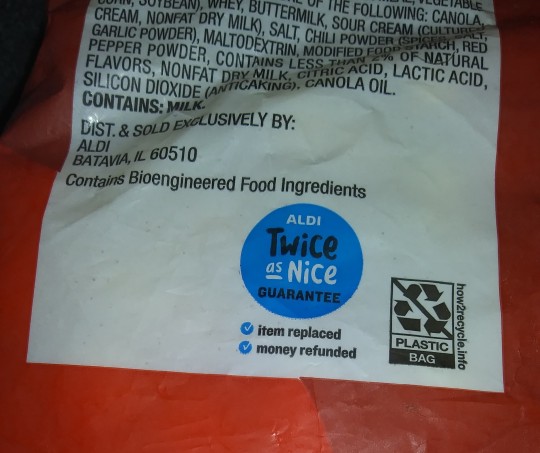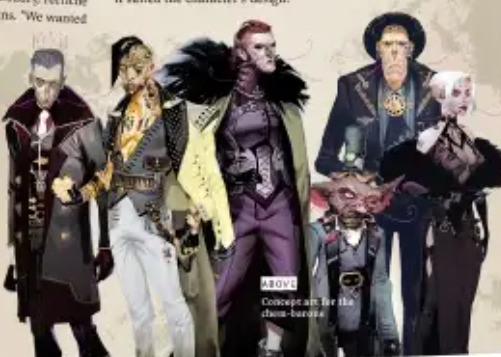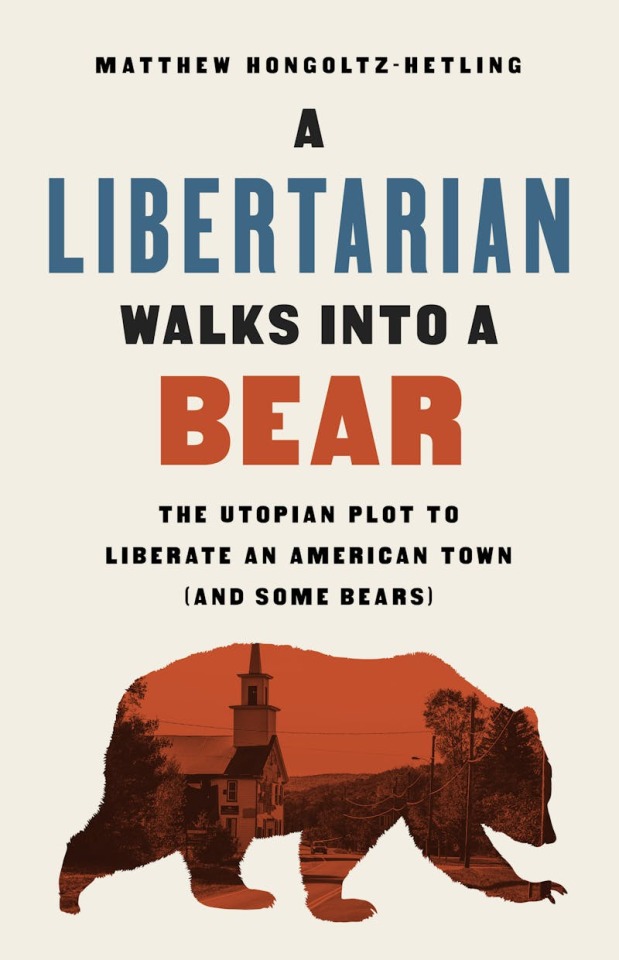#Utopia Market
Explore tagged Tumblr posts
Text













#Aldi #UtopiaMarket #AldiUtopiaMarketBravoCreamyChiliFlavoredPuffedCornSnacks #FlavoredPuffedCornSnacksReview
I tried the Aldi Utopia Market Bravo Creamy Chili Flavored Puffed Corn Snack and it was expired but a little editable.
This was soft and crunchy but smelled stale. This also tasted stale but had a little chili pepper flavor left in it. This was lightly salty to me but not overly.
I only ate one piece.
I had this sitting around so it's my bad and I wanted to see if this was still good.
I will buy a fresh bag of this later if I see it again to edit this review.
Got at Aldi.
#Aldi#Utopia Market#Aldi Utopia Market Bravo Creamy Chili Flavored Puffed Corn Snacks#Flavored Puffed Corn Snacks Review
0 notes
Text
… How did the Far Right claim Touhou, a, for lack of a better term, media franchise with works with messages like "Immigration is good and complaining about or demonizing it ultimately serves fascists" (Alternative Facts in Eastern Utopia), "Markets honestly just kind of suck in general" (Unconnected Marketeers and 100th Black Market taken together, with the former having a plot about the exploitation of markets to enrich a few with a controlling interest and how controls on them can ultimately be gamed by those wishing to use them to their advantage, and the latter a message about how without control, markets ultimately even moreso end up enriching whoever's savvy and unscrupulous enough to take advantage), or "Capitalism is basically rule by organized crime in which everyone except the most powerful are slaves to those with more." (That's… not a subtle subtext to Wily Beast and Weakest Creature, or even just anything at all to do with the Animal Realm)
#Toy#Touhou#Alternative Facts in Eastern Utopia#Unconnected Marketeers#100th Black Market#Wily Beast and Weakest Creature#Sunken Fossil World#Unfinished Dream of All Living Ghost#Touhou Project
21 notes
·
View notes
Text
Do you guys remember the british tv show Misfits that truly introduced the insane acting range of the guy who in Game of Thrones cut Theon Greyjoys's dick off and just how insanely good that show was
#when rob stark died misfits fans were posting pics of the stark lady you know the mother#dont remember her name#saying 'shoulda stayed in misfits at least there your son was immortal' LMAO#Misfits and Utopia are two of the best TV experiences I've ever had#and by Utopia I mean the British version#not that fincher shit#no hate to fincher#well a little bit of hate towards fincher but thats person#but the og utopia is a visual experience unlike any other#also apologies i dont remember the name of the actor#i believe he's welsh tho#also misfits was revolutionary because it was completely shot with a Canon DOS 7#EOS 7*#which was the best and most affordable one on the market in 2009#and like there's better cameras since#but the quality still holds up#i was studying cinemq at the time and it was a huge deal
20 notes
·
View notes
Text

Capitalist Utopia Argentina faces some very minor problems. Nothing the invisible hand of the free market couldn't fix
#Capitalist Utopia Argentina faces some very minor problems. Nothing the invisible hand of the free market couldn't fix#argentina#free market#invisible hand#eat the rich#eat the fucking rich#class war#antiwork#anti slavery#fuck work#ausgov#politas#auspol#tasgov#taspol#australia#fuck neoliberals#neoliberal capitalism#anthony albanese#albanese government#anti capitalism#antinazi#antiauthoritarian#anti colonialism#anti cop#anti colonization#wage slavery#slave wages#slavery#slaves
3 notes
·
View notes
Text
Not to be like a crotchety old grandpa waving my cane at middle school hooligans but I do wish (especially) young, very online queer folks would take a sec to learn a little more about like political movements and social change
#like yes rainbow capitalism is superficial and frustrating and oftentimes hypocritical#but throwing a tantrum about it doesn’t tell those companies to do more meaningful work#it tells them we’re not a market and therefore they should for profit’s sake target other audiences#which like yeah IS shitty and not how social change should work#but we do live in a capitalist society atm#and until The Glorious Revolution Directly Leading Us to Utopia shows up#we work with the tools we have#similarly politics#like listening to the decision on the Louisiana bill#the legal arguments used to table it make me bristle a little#I don’t think children’s identities should come down to parents’ choice#(this is a simplification)#BUT by using the arguments they chose#those legislators are speaking to a population that can be convinced to care abt this shit#and doing it in a way that for instance I would struggle to#and that’s good!!#because it is actually better to have momentum gaining towards a goal#than it is to get locked up in infighting and pushing away potential support#people run races for a lot of different reasons#but the fact that everyone is aiming for the same goal#is what makes it a race rather than chaos#anyway I am off my soapbox this is just. a persistent frustration#personal
10 notes
·
View notes
Text
youtube
CRYPTOPIA: Bitcoin, Blockchains and The Future of the Internet - FULL DOCUMENTARY | Torsten Hoffmann
Cryptopia: Bitcoin, Blockchains and the Future of the Internet takes a deep dive into the crypto ecosystem and blockchain technology to discover the good, the bad and the ugly of this controversial industry, its major narratives, conflicts and the major players behind it. Can we really trust them to build this trustless cyber utopia or are their projects just as unfairly distributed and easily manipulated as our current financial systems and tech platforms?
#youtube#bitcoin#crypto market#documentary#cryptopia#internet#blockchain#torsten hoffmann#crypto#controversial#cyber utopia#trustless#ponzi scheme#digital currency
0 notes
Text
i have rule i semi-adhere to for media criticism which is to ideologically meet shit where it's at (or where it's presented to me). i like to call it the "i didn't make you market it that way" rule--like, if lancer's union was just presented as a sci-fi setting, that would be fine. i don't expect all sci-fi settings to be communist utopias! but when the creators of lancer use the word utopia like 20 times & bandy around words like 'mutual aid' and 'post-scarcity' and 'anticapitalist' when describing it, then to me that becomes absolutely fair game. similarly if someone says 'stardew valley is fun i like farming :)' then i'm not gonna reply with a long post about how it's ideologically petty-bourgeois--but if they say 'stardew valley is anticapitalist', then they've opened up that can of worms and it's fair for me to point out that the worms exist.
26K notes
·
View notes
Text
Burning Man is less about “eat the rich” and the complete disregard for the natural environment that those attending have embraced while claiming to be so about community. (How can you claim to be community focused when your chosen location degrades the equipment of the people who attend? They’re very self-selecting about who attends without saying they are. Even the cheapest tickets require like $2K once you add in everything.)
It’s more like the libertarian town that got invaded by bears. I felt for the original locals in that - only there are no locals at Burning Man. Everyone decided to be part of an event to “burn the man” despite how much they now cater to influencers.
“Eat the rich” is the wrong battle cry, but I don’t think we have one that gets more nuanced. You want to go after the people who are using up the resources at an unsustainable pace, that are setting the bar and selling out everyone else for their own enjoyment - How do we sum that up?
Anyway, check out https://www.jetfinder.com/burning-man-festival/ and their recommendations!
I’m aware most of the 72,000 people there are not “private jet” rich, but pretending Burning Man doesn’t cater to “$500 is a rounding error” rich is silly
Seeing the notes on posts about the Burning Man Debacle™ and for fucks sake I am taking the phrase 'eat the rich' away from y'all until you can CORRECTLY IDENTIFY the rich
Rich is 'arrived by way of their private jet', is 'dropped $500k on a submarine ticket', is '$500 is a rounding error'.
'$500 dollars for a nine day event they must all be rich white people' no you reactionary rotten potato that is actually an entirely reasonable price for an entirely normal person to pay for an annual event! $500 over the course of a year is approximately equivalent to one big takeout a month! Being able to afford that doesn't make you rich it makes you probably not poor! The 'rich or poor' narrative is a false dichotomy that completely excludes the fact that 'richness' or 'poorness' is a SCALE! It's not fucking categorical! You don't one day magically flip a switch and go from 'poor' to 'rich' or vice versa you see incremental changes over time! Wealth distribution is a (these days, admittedly, rather wonky) motherfucking BELL CURVE! . The fact that capitalism is driving more and more people to either extreme of said curve is just evidence of a broken system, but it doesn't change the fact that most people should have a decent amount of disposable income!
The fact that many people don't have said disposable income doesn't magically make the ones that do 'rich' it makes everyone else poor. And the people at fault for the massive and growing percentage of people living below the poverty line are not the ones managing to stay above it, it's the fault of the actually rich, the ones stealing our time and our health and our wages and our future in pursuit of a number on a screen. And the rich are the only people you're helping by hating the people struggling slightly less than you.
When it comes time to 'eat the rich' you're going to be murdering dentists and librarians and scientists while the actually rich point and laugh from a safe distance as you solve their problems for them.
#I don't have a simple solution#but thinking Burning Man is most 'people struggling slightly less than you' isn't true#this is a curated community that can pretend it's only $500 while hiding prices elsewhere#and that they sell themselves as the opposite is really aggravating#IT IS 70000 PEOPLE SHOWING UP IN THE DESERT FOR A WEEK#do you realize how many people that is?#do you realize how messed up that is on any level?#70000 people told to manage their own WATER AND FOOD supply (cuz you can't buy it)#you cannot pretend that is an 'everyman' experience even before they got flooded#i feel for them but Reno is doing everything it can and (technically) they should have all the food and water they need#if their food containers are dust/sand proof then they are water proof#but yeah#eat the rich#cuz only the stupid rich can set up a freaking pop-up city in the desert#if you want nuance you really got to look into the system itself#70000 is more people than where sent out on the perfectly normal spaceship#(I may be messing up the zeros at this point so 70K from now on)#Darin - if you read this far into these notes at all - you way underestimated how many people think they can start utopia 'on their own'#javalin needed better marketing a few festival and them camps and people would've been all for it ... sorry#I'll stop ranting now#I really just hadn't realized how messed up the whole thing was before now
23K notes
·
View notes
Video
tumblr
Entireworld launch video: It's always seemed a shame that Entireworld failed, the idea of having a basics brand that actually had an idea and design direction behind it rather than the VC led blandness of Everlane and its many imitators. This remains a perfect encapsulation of the promise of the brand.
1 note
·
View note
Text
Post-Modernist Coconut Grove House From the '70s Has Been Updated Really Nicely
Straight out of the golden age of Coconut Grove.

View On WordPress
0 notes
Text
People need to be reminded of Trump's woeful incompetence which came to a head during the pandemic emergency and resulted in the unnecessary deaths of hundreds of thousands of Americans.
The Obama administration successfully dealt with the threats from swine flu and Ebola. There was no swine flu disaster, there was no Ebola disaster, and there was even no Zika disaster because competent people were running the US. Near the end of Obama's term, his National Security Council staff put together a 69-page playbook on how to deal with pandemic emergencies. It's called "Playbook for Early Response to High-Consequence Emerging Infectious Disease Threats and Biological Incidents". Of course Trump ignored the document and plunged the nation into COVID hell.
Trump team failed to follow NSC’s pandemic playbook
Michelle Obama, in one of her best speeches ever in Kalamazoo this weekend, excoriated Trump's incompetence.
Michelle Obama laced into Donald Trump in a searing speech in Michigan on Saturday, accusing the former president of “gross incompetence” and having an “amoral character” while challenging hesitant Americans to choose Kamala Harris for US president. “By every measure, she has demonstrated that she’s ready,” the former first lady told a rapt audience in Kalamazoo. “The real question is, as a country, are we ready for this moment?” [ ... ] In raw and strikingly personal terms, she asked why Harris was being held to a “higher standard” than her opponent. Trump’s handling of the Covid-19 pandemic and his failed attempt to cling to power after losing the 2020 election should alone be disqualifying, Obama argued. But now the people who worked closest with him when he was president – his former advisers and cabinet secretaries – had stepped forward with a warning that he should not be allowed to return to power.
ICYMI, here is Michelle Obama's speech in Michigan.
youtube
Too many people have been afflicted by Trumpnesia. They seem to have forgotten the catastrophe that happened starting on 22 January 2020 when the first COVID infection was discovered on US soil. On that day Trump told CNBC: "we have it totally under control" and "it's going to be just fine".
Instead of following Playbook for Early Response to High-Consequence Emerging Infectious Disease Threats and Biological Incidents, Trump did the usual bullshit Trump things like criticize the Oscars and rage-tweet from the bathroom. He belatedly declared a state of emergency on Friday the 13th of March – the day after the stock market crashed.
Don't let anybody in real life get away with describing the Trump years as some sort of utopia.
Some people disingenuously claim they don't know enough about Kamala Harris despite her 20 years in public service. We all know more than enough about Trump's egregious ineptitude which turned a national emergency into a prolonged national nightmare.
#michelle obama#kalamazoo#donald trump#trump's incompetence#trumpnesia#covid-19#coronavirus#pandemic emergency#playbook for early response to high-consequence emerging infectious disease threats and biological incidents#obama administration#kamala harris#election 2024#vote blue no matter who
520 notes
·
View notes
Text













#Aldi #UtopiaMarket #AldiUtopiaMarketGustoMangoHabaneroFlavoredPuffedCornSnacks #FlavoredPuffedCornSnacksReview
I tried the Aldi Utopia Market Gusto Mango Habanero Flavored Puffed Corn Snack and it was expired but a little editable.
This was soft and crunchy but smelled stale. This also tasted stale but had a little flavor sweet and light spice left in it. This was lightly salty to me but not overly.
I only ate one piece.
I had this sitting around so it's my bad and I wanted to see if this was still good.
I will buy a fresh bag of this later if I see it again to edit this review.
Got at Aldi.
#Aldi#Utopia Market#Aldi Utopia Market Gusto Mango Habanero Flavored Puffed Corn Snacks#Flavored Puffed Corn Snacks Review
0 notes
Text
Arcane Team's Bias Bastardized Piltover and Zaun
I am not an LoL player, but I read up on the lore because I was that fucking disappointed in season 2. Some key points of original Piltover and Zaun lore, which the team kept parts of. Emphasis on parts.
Geography and Symbiotic Economy:
Zaun was established first. A geographic disaster literally split the earth and sunk part of the city, splitting it into what we know today. Many of the wealthier citizens and those involved in the profitable sea trade ended up on a cliffside and industrial parts of Zaun were now across a river and below. They then became separate city-states in a symbiotic relationship.
"Zaun thrives, its people vibrant and its culture rich."
Zaun has multiple levels of "good" areas like the college and Bridgewaltz market where both citizens shopped for music, food, technology in addition to progressively more polluted and dangerous lower levels.
Piltover’s wealth has allowed Zaun to develop in tandem
Zaun's issues like the Gray were attributed to their own factories and labs that benefitted their own people
Culture and Relationship:
Zaunities collectively take great pride in themselves and their thriving city. Many choose to live there, especially scientists and inventors who find Piltover too restricted, because "their right to do as they please is what makes Zaun the freest city-state on Runeterra"
"A citizen of Piltover is typically self-reliant, does not expect handouts, and always aspires to do better."
Piltover has an elected "very empathic and progressive" government and is "one of the least militarized city-states"
Zaun's technological progress and academic institutions are described as being Piltover's only technological and academic rival.
Both cities' citizens augment their bodies. Piltover's are more flamboyant and display their wealth, even if they are originally necessary; Zaun's are more practical and "necessity is the mother of invention" very much applies.
So this was what they had to work with. I can understand why many people would prefer to live in Piltover, but Zaun is treated as an equal place to be, with its own distinct and proud culture, complex structure, and thriving economy.
Moving on to Arcane (finally lol) and the now infamous original Arcane pitch. Either Christian posted that while every sane person was asleep, or none of them realized how profoundly terrible it makes them look.

There's a lot in here that's problematic. Piltover is a gleaming wonder, a pure and magical place while conveniently leaving out why its this flourishing utopia. The next bit frames the entire conflict as Piltover's decision. It screams "Mommy and Daddy need to punish the naughty kids or they'll wreck the house." Except the starving kids are locked in the moldy basement and trying to break the door down to escape.
Now about Zaun...here its called the underground district. This becomes more important later, when you realize how many different and contradictory labels they give Zaun. Its an undercity, sister city, part of Piltover, wannabe Nation of Zaun. It establishes again the underlying superiority of Piltover. And of course it is, because Zaun's people are boiled down to dangerous, manipulative criminals (bonus points for an antisemetic reference!) with no morality.
I firmly believe this team has a fundamental deliberate misinterpretation of what LoL Piltover and Zaun are, and it is due to their own biases and privileges of a team that is primarily white, middle/upper class, able-bodied, and mostly male. It is abundantly clear that they see as Zaun is objectively lesser and that its their own fault. They're just a foil for Piltover and source of enemies. Three quotes from Arnaud-Lois Baudry:
"My role as a Production Designer was to make sure we don't negatively impact other teams at Riot Games and contribute to adding value and enriching the worldbuilding of those cities."
"Once we figured out the shape language of the wealthy city of Piltover, Zaun needed to be its dark mirror. We started by combining Victorian architectural pieces and some old industrial elements and added some asymmetrical flourish ornaments made from handcrafted upcycled pieces."
"Canonically Zaun is supposed to be super-dark, oily, and dirty with green smoke everywhere." Dude it is literally called The Gray. Zaun's marketplace, college, and an example of their architectural style from the LoL website:

Zaun is literally an afterthought. And I think its very telling that once again, Piltover was the priority. Magical, pure Piltover with its moral code...and Zaun was literally just designed to be its opposite. They claim that the show was designed to show the good and bad parts of both, but they failed to include any direct evidence that the problems in Zaun are entirely due to Piltover's treatment of them. They literally just took LoL Zaun, scooped the top (more prosperous) levels off, and buried it under Piltover. Piltover was enriched, and even benefited by inspiration from Eastern European culture like Nikola Tesla and Czech artist Alphonse Mucha. And then gave Viktor the only "foreign" accent in the show to further emphasize his disadvantaged upbringing and displacement in Piltover society. As someone with an Eastern European/Slavic background, I cannot emphasize this enough: fuck. every. last. one. of. you.
*sigh* Moving on to the "value and enrichment" given to Zaun:
cities described as "dissonant halves of the a greater whole" rather than symbiotic
Piltover came first, and the undercity later develops into Zaun. No mention of historical or present-day Zaun having anything to do with Piltover's success. Literally nothing is explicitly connected, though we do get Cait committing war crimes using tech her Mom installed to help the Zaunites from suffering the effects of pollution.
Speaking of pollution, AoA explictly states neither city has "big industry, there are no factories". Uhh then where is the pollution coming from?
It is portrayed unflatteringly with two notable exceptions (the Last Drop and Firelight tree), specifically in the ways that are in real life associated with racism, classism, body shaming, and cultural shaming. Its subtle at times, but a constant theme in their book, interviews, and the show itself.
In AoA, the Piltie extras are "understudies" and the Zaunites are "a motely crew".
Piltover has “normal” food like tea and sandwiches, while Zaun has what appears to be slugs in a muddy sauce from an unsanitary food stall that also displays drooling animal heads and tentacles.
All the Pilties are thin; the only overweight people (who are also usually morbidly obese) are from Zaun.
In Art of Arcane (AoA) they talk about how they specifically chose to design the Chem-Barons "more cartoony than grotesque" and that they made sure to have "a few landmarks, like the bridge, so it doesn't feel too cartoony" when designing Piltover.
Only the Zaunites use augmentation. Its a defining characteristic and objectively "bad". AoA explicitly correlates Viktor fixing his leg and spine with losing parts of his humanity. Lord know what they think of the multitude of augmented-out-of-necessity Zaunites. Coincidentally, the other character most associated with augments is Smeech, the cartoony drowned-rat-looking antagonistic Yordle, whose fight serves as a humorous scene endearing Jinx to the viewers.
They created the Piltover Council and then decided to make the Chem-Barons their direct counterparts, because DUALITY! Seriously, is anyone in Zaun NOT somehow just a "worse" version of a Piltie?


#arcane zaun#arcane piltover#arcane parallels#arcane critique#arcane critical#arcane criticism#oppression#stereotypes#classism#league of legends#piltover and zaun#arcane viktor#antisemitism#ableism#art of arcane#arcane meta#christian linke#amanda overton#alex yee#arcane season 2#arcane season one#arcane#arcane netflix#arcane analysis
125 notes
·
View notes
Text

A Libertarian Walks Into a Bear: The Utopian Plot to Liberate an American Town (and Some Bears)
PublicAffairs, 288 pp., $28.00
But don’t worry—it almost never comes to this. As one park service PSA noted this summer, bears “usually just want to be left alone. Don’t we all?” In other words, if you encounter a black bear, try to look big, back slowly away, and trust in the creature’s inner libertarian. Unless, that is, the bear in question hails from certain wilds of western New Hampshire. Because, as Matthew Hongoltz-Hetling’s new book suggests, that unfortunate animal may have a far more aggressive disposition, and relate to libertarianism first and foremost as a flavor of human cuisine.
Hongoltz-Hetling is an accomplished journalist based in Vermont, a Pulitzer nominee and George Polk Award winner. A Libertarian Walks Into a Bear: The Utopian Plot to Liberate an American Town (and Some Bears) sees him traversing rural New England as he reconstructs a remarkable, and remarkably strange, episode in recent history. This is the so-called Free Town Project, a venture wherein a group of libertarian activists attempted to take over a tiny New Hampshire town, Grafton, and transform it into a haven for libertarian ideals—part social experiment, part beacon to the faithful, Galt’s Gulch meets the New Jerusalem. These people had found one another largely over the internet, posting manifestos and engaging in utopian daydreaming on online message boards. While their various platforms and bugbears were inevitably idiosyncratic, certain beliefs united them: that the radical freedom of markets and the marketplace of ideas was an unalloyed good; that “statism” in the form of government interference (above all, taxes) was irredeemably bad. Left alone, they believed, free individuals would thrive and self-regulate, thanks to the sheer force of “logic,” “reason,” and efficiency. For inspirations, they drew upon precedents from fiction (Ayn Rand loomed large) as well as from real life, most notably a series of micro-nation projects ventured in the Pacific and Caribbean during the 1970s and 1980s.
None of those micro-nations, it should be observed, panned out, and things in New Hampshire don’t bode well either—especially when the humans collide with a newly brazen population of bears, themselves just “working to create their own utopia,” property lines and market logic be damned. The resulting narrative is simultaneously hilarious, poignant, and deeply unsettling. Sigmund Freud once described the value of civilization, with all its “discontents,” as a compromise product, the best that can be expected from mitigating human vulnerability to “indifferent nature” on one hand and our vulnerability to one another on the other. Hongoltz-Hetling presents, in microcosm, a case study in how a politics that fetishizes the pursuit of “freedom,” both individual and economic, is in fact a recipe for impoverishment and supercharged vulnerability on both fronts at once. In a United States wracked by virus, mounting climate change, and ruthless corporate pillaging and governmental deregulation, the lessons from one tiny New Hampshire town are stark indeed.
“In a country known for fussy states with streaks of independence,” Hongoltz-Hetling observes, “New Hampshire is among the fussiest and the streakiest.” New Hampshire is, after all, the Live Free or Die state, imposing neither an income nor a sales tax, and boasting, among other things, the highest per capita rate of machine gun ownership. In the case of Grafton, the history of Living Free—so to speak—has deep roots. The town’s Colonial-era settlers started out by ignoring “centuries of traditional Abenaki law by purchasing land from founding father John Hancock and other speculators.” Next, they ran off Royalist law enforcement, come to collect lumber for the king, and soon discovered their most enduring pursuit: the avoidance of taxes. As early as 1777, Grafton’s citizens were asking their government to be spared taxes and, when they were not, just stopped paying them.
Nearly two and a half centuries later, Grafton has become something of a magnet for seekers and quirky types, from adherents of the Unification Church of the Reverend Sun Myung Moon to hippie burnouts and more. Particularly important for the story is one John Babiarz, a software designer with a Krusty the Klown laugh, who decamped from Big-Government-Friendly Connecticut in the 1990s to homestead in New Hampshire with his equally freedom-loving wife, Rosalie. Entering a sylvan world that was, Hongoltz-Hetling writes, “almost as if they had driven through a time warp and into New England’s revolutionary days, when freedom outweighed fealty and trees outnumbered taxes,” the two built a new life for themselves, with John eventually coming to head Grafton’s volunteer fire department (which he describes as a “mutual aid” venture) and running for governor on the libertarian ticket.
Although John’s bids for high office failed, his ambitions remained undimmed, and in 2004 he and Rosalie connected with a small group of libertarian activists. Might not Grafton, with its lack of zoning laws and low levels of civic participation, be the perfect place to create an intentional community based on Logic and Free Market Principles? After all, in a town with fewer than 800 registered voters, and plenty of property for sale, it would not take much for a committed group of transplants to establish a foothold, and then win dominance of municipal governance. And so the Free Town Project began. The libertarians expected to be greeted as liberators, but from the first town meeting, they faced the inconvenient reality that many of Grafton’s presumably freedom-loving citizens saw them as outsiders first, and compatriots second—if at all. Tensions flared further when a little Googling revealed what “freedom” entailed for some of the new colonists. One of the original masterminds of the plan, a certain Larry Pendarvis, had written of his intention to create a space honoring the freedom to “traffic organs, the right to hold duels, and the God-given, underappreciated right to organize so-called bum fights.” He had also bemoaned the persecution of the “victimless crime” that is “consensual cannibalism.” (“Logic is a strange thing,” observes Hongoltz-Hetling.)
While Pendarvis eventually had to take his mail-order Filipina bride business and dreams of municipal takeovers elsewhere (read: Texas), his comrades in the Free Town Project remained undeterred. Soon, they convinced themselves that, evidence and reactions to Pendarvis notwithstanding, the Project must actually enjoy the support of a silent majority of freedom-loving Graftonites. How could it not? This was Freedom, after all. And so the libertarians keep coming, even as Babiarz himself soon came to rue the fact that “the libertarians were operating under vampire rules—the invitation to enter, once offered, could not be rescinded.” The precise numbers are hard to pin down, but ultimately the town’s population of a little more than 1,100 swelled with 200 new residents, overwhelmingly men, with very strong opinions and plenty of guns.
Hongoltz-Hetling profiles many newcomers, all of them larger-than-life, yet quite real. The people who joined the Free Town Project in its first five years were, as he describes, “free radicals”—men with “either too much money or not enough,” with either capital to burn or nothing to lose. There’s John Connell of Massachusetts, who arrived on a mission from God, liquidated his savings, and bought the historic Grafton Center Meetinghouse, transforming it into the “Peaceful Assembly Church,” an endeavor that mixed garish folk art, strange rants from its new pastor (Connell himself), and a quixotic quest to secure tax exemption while refusing to acknowledge the legitimacy of the IRS to grant it. There’s Adam Franz, a self-described anti-capitalist who set up a tent city to serve as “a planned community of survivalists,” even though no one who joined it had any real bushcraft skills. There’s Richard Angell, an anti-circumcision activist known as “Dick Angel.” And so on. As Hongoltz-Hetling makes clear, libertarianism can indeed have a certain big-tent character, especially when the scene is a new landscape of freedom-lovers making “homes out of yurts and RVs, trailers and tents, geodesic domes and shipping containers.”
If the Libertarian vision of Freedom can take many shapes and sizes, one thing is bedrock: “Busybodies” and “statists” need to stay out of the way. And so the Free Towners spent years pursuing an aggressive program of governmental takeover and delegitimation, their appetite for litigation matched only by their enthusiasm for cutting public services. They slashed the town’s already tiny yearly budget of $1 million by 30 percent, obliged the town to fight legal test case after test case, and staged absurd, standoffish encounters with the sheriff to rack up YouTube hits. Grafton was a poor town to begin with, but with tax revenue dropping even as its population expanded, things got steadily worse. Potholes multiplied, domestic disputes proliferated, violent crime spiked, and town workers started going without heat. “Despite several promising efforts,” Hongoltz-Hetling dryly notes, “a robust Randian private sector failed to emerge to replace public services.” Instead, Grafton, “a haven for miserable people,” became a town gone “feral.” Enter the bears, stage right.
Black bears, it should be stressed, are generally a pretty chill bunch. The woods of North America are home to some three-quarters of a million of them; on average, there is at most one human fatality from a black bear attack per year, even as bears and humans increasingly come into contact in expanding suburbs and on hiking trails. But tracking headlines on human-bear encounters in New England in his capacity as a regional journalist in the 2000s, Hongoltz-Hetling noticed something distressing: The black bears in Grafton were not like other black bears. Singularly “bold,” they started hanging out in yards and on patios in broad daylight. Most bears avoid loud noises; these casually ignored the efforts of Graftonites to run them off. Chickens and sheep began to disappear at alarming rates. Household pets went missing, too. One Graftonite was playing with her kittens on her lawn when a bear bounded out of the woods, grabbed two of them, and scarfed them down. Soon enough, the bears were hanging out on porches and trying to enter homes.
Combining wry description with evocative bits of scientific fact, Hongoltz-Hetling’s portrayal of the bears moves from comical if foreboding to downright terrifying. These are animals that can scent food seven times farther than a trained bloodhound, that can flip 300-pound stones with ease, and that can, when necessary, run in bursts of speed rivaling a deer’s. When the bears finally start mauling humans—attacking two women in their homes—Hongoltz-Hetling’s relation of the scenes is nightmarish. “If you look at their eyes, you understand,” one survivor tells him, “that they are completely alien to us.”
What was the deal with Grafton’s bears? Hongoltz-Hetling investigates the question at length, probing numerous hypotheses for why the creatures have become so uncharacteristically aggressive, indifferent, intelligent, and unafraid. Is it the lack of zoning, the resulting incursion into bear habitats, and the reluctance of Graftonites to pay for, let alone mandate, bear-proof garbage bins? Might the bears be deranged somehow, perhaps even disinhibited and emboldened by toxoplasmosis infections, picked up from eating trash and pet waste from said unsecured bins? There can be no definitive answer to these questions, but one thing is clear: The libertarian social experiment underway in Grafton was uniquely incapable of dealing with the problem. “Free Towners were finding that the situations that had been so easy to problem-solve in the abstract medium of message boards were difficult to resolve in person.”
Grappling with what to do about the bears, the Graftonites also wrestled with the arguments of certain libertarians who questioned whether they should do anything at all—especially since several of the town residents had taken to feeding the bears, more or less just because they could. One woman, who prudently chose to remain anonymous save for the sobriquet “Doughnut Lady,” revealed to Hongoltz-Hetling that she had taken to welcoming bears on her property for regular feasts of grain topped with sugared doughnuts. If those same bears showed up on someone else’s lawn expecting similar treatment, that wasn’t her problem. The bears, for their part, were left to navigate the mixed messages sent by humans who alternately threw firecrackers and pastries at them. Such are the paradoxes of Freedom. Some people just “don’t get the responsibility side of being libertarians,” Rosalie Babiarz tells Hongoltz-Hetling, which is certainly one way of framing the problem.
Pressed by bears from without and internecine conflicts from within, the Free Town Project began to come apart. Caught up in “pitched battles over who was living free, but free in the right way,” the libertarians descended into accusing one another of statism, leaving individuals and groups to do the best (or worst) they could. Some kept feeding the bears, some built traps, others holed up in their homes, and still others went everywhere toting increasingly larger-caliber handguns. After one particularly vicious attack, a shadowy posse formed and shot more than a dozen bears in their dens. This effort, which was thoroughly illegal, merely put a dent in the population; soon enough, the bears were back in force.
Meanwhile, the dreams of numerous libertarians came to ends variously dramatic and quiet. A real estate development venture known as Grafton Gulch, in homage to the dissident enclave in Ayn Rand’s Atlas Shrugged, went belly-up. After losing a last-ditch effort to secure tax exemption, a financially ruined Connell found himself unable to keep the heat on at the Meetinghouse; in the midst of a brutal winter, he waxed apocalyptic and then died in a fire. Franz quit his survivalist commune, which soon walled itself off into a prisonlike compound, the better to enjoy freedom. And John Babiarz, the erstwhile inaugurator of the Project, became the target of relentless vilification by his former ideological cohorts, who did not appreciate his refusal to let them enjoy unsecured blazes on high-wildfire–risk afternoons. When another, higher-profile libertarian social engineering enterprise, the Free State Project, received national attention by promoting a mass influx to New Hampshire in general (as opposed to just Grafton), the Free Town Project’s fate was sealed. Grafton became “just another town in a state with many options,” options that did not have the same problem with bears.
Or at least—not yet. Statewide, a perverse synergy between conservationist and austerity impulses in New Hampshire governance has translated into an approach to “bear management” policy that could accurately be described as laissez-faire. When Graftonites sought help from New Hampshire Fish and Game officials, they received little more than reminders that killing bears without a license is illegal, and plenty of highly dubious victim-blaming to boot. Had not the woman savaged by a bear been cooking a pot roast at the time? No? Well, nevertheless. Even when the state has tried to rein in the population with culls, it has been too late. Between 1998 and 2013, the number of bears doubled in the wildlife management region that includes Grafton. “Something’s Bruin in New Hampshire—Learn to Live with Bears,” the state’s literature advises.
The bear problem, in other words, is much bigger than individual libertarian cranks refusing to secure their garbage. It is a problem born of years of neglect and mismanagement by legislators, and, arguably, indifference from New Hampshire taxpayers in general, who have proved reluctant to step up and allocate resources to Fish and Game, even as the agency’s traditional source of funding—income from hunting licenses—has dwindled. Exceptions like Doughnut Lady aside, no one wants bears in their backyard, but apparently no one wants to invest sustainably in institutions doing the unglamorous work to keep them out either. Whether such indifference and complacency gets laundered into rhetoric of fiscal prudence, half-baked environmentalism, or individual responsibility, the end result is the same: The bears abide—and multiply.
Their prosperity also appears to be linked to man-made disasters that have played out on a national and global scale—patterns of unsustainable construction and land use, and the climate crisis. More than once, Hongoltz-Hetling flags the fact that upticks in bear activity unfold alongside apparently ever more frequent droughts. Drier summers may well be robbing bears of traditional plant and animal sources of food, even as hotter winters are disrupting or even ending their capacity to hibernate. Meanwhile, human garbage, replete with high-calorie artificial ingredients, piles up, offering especially enticing treats, even in the dead of winter—particularly in places with zoning and waste management practices as chaotic as those in Grafton, but also in areas where suburban sprawl is reaching farther into the habitats of wild animals. The result may be a new kind of bear, one “torn between the unique dangers and caloric payloads that humans provide—they are more sleep-deprived, more anxious, more desperate, and more twitchy than the bear that nature produced.” Ever-hungry for new frontiers in personal autonomy and market emancipation, human beings have altered the environment with the unintended result of empowering newly ravenous bears to boot.
Ignoring institutional failure and mounting crises does not make them go away. But some may take refuge in confidence that, when the metaphorical chickens (or, rather, bears) finally come home to roost, the effects are never felt equally. When bears show up in higher-income communities like Hanover (home to Dartmouth College), Hongoltz-Hetling notes, they get parody Twitter accounts and are promptly evacuated to wildernesses in the north; poorer rural locales are left to fend for themselves, and the residents blamed for doing what they can. In other words, the “unintended natural selection of the bears that are trying to survive alongside modern humans” is unfolding along with competition among human beings amid failing infrastructure and scarce resources, a struggle with Social Darwinist dynamics of its own.
The distinction between a municipality of eccentric libertarians and a state whose response to crisis is, in so many words, “Learn to Live With It” may well be a matter of degree rather than kind. Whether it be assaults by bears, imperceptible toxoplasmosis parasites, or a way of life where the freedom of markets ultimately trumps individual freedom, even the most cocksure of Grafton’s inhabitants must inevitably face something beyond and bigger than them. In that, they are hardly alone. Clearly, when it comes to certain kinds of problems, the response must be collective, supported by public effort, and dominated by something other than too-tidy-by-half invocations of market rationality and the maximization of individual personal freedom. If not, well, then we had all best get some practice in learning when and how to play dead, and hope for the best.
112 notes
·
View notes
Text
The Light of Absent Eyes
Vander has taken to visiting Ekko's mural on quiet evenings. Without the oppressive haze of the grey, Zaun's nights are colder than they used to be. Silco, ever observant, brings him his sweater. Sentimental shenanigans ensue.
Read on AO3
Rating: T for mild smut
Tags: Silco/Vander, S2 Utopia AU, Fluff, Old men being sappy and cute, Multiverse-Typical OOC
Word Count: 2110

Without early winter's chill in the air, Silco thought, this place would smell intolerably swampy. A few browning lilypads still clung to the surface of the pool, and a carpet of the giant ginkgo tree's shed leaves slid and squished under his boots as he made his way through the water. Dusk barely filtered down into the abandoned reservoir, and the only clear light came from a cluster of mismatched candles in front of the mural of a young woman's face. A young woman with fiery red hair and a fighter's wraps on her hands. A young woman whose expressions made her look by turns angry and angular, soft and smiling, and utterly at home in her own skin.
A young woman Silco had never met, and never would.
"Missed me that much, eh?" Vander was leaning against one of the mossy concrete pipes that littered the reflecting pool, and his voice echoed off the metal walls around them.
"Were you gone?" Silco asked with a mocking tilt of his head, slinging Vander's thick, much-mended cardigan off his shoulders and holding it out toward him. "You shouldn't be wandering around the fissures this time of night in your shirtsleeves."
"Yeah, alright, mum," Vander said with a good-humored roll of his eyes as he shrugged his arms into the sweater. In the poor light, Powder's riotously-colored darning washed out to a shadowy camouflage around the cuffs and elbows like flashes of unpolished ore emerging from the mud-brown yarn.
"I'm serious. Winter's getting colder every year since they redid the air filters," he said, wrapping his arms across his chest and burrowing his chin further into his scarf as he settled himself next to Vander on the concrete pipe. "Not that I miss the grey, mind, but I'm beginning to understand the topsiders' penchant for hats and gloves and twenty-seven petticoats at a time."
"Oh?" Vander reached over to twine a finger absently through the fringe on Silco's scarf. "Is that why a pallet of Shuriman cashmere shawls fell off the back of an airship straight into the upstairs storage closet?"
"Just reading the market, darling. Remember our deal," he said as he gently unwound Vander's hand and held it in his own. "You don't stick your nose into my perfectly legitimate import-export business, and I don't complain that you still don't put enough bitters in an Old Fashioned."
"I did agree to that, didn't I." He shook his head and settled his hand comfortably on Silco's knee. Wind sighed across the mouth of the reservoir far above, scattering a grace of golden leaves across them. Vander looked up into the branches, one fan-shaped leaf caught against his hair.
It pulled at something in Silco's chest, the thin thread between them that had been cut and re-tied against all better judgment, frayed and worn and haphazardly repaired again and again. Stronger at the mended places, he thought as he plucked the leaf between his fingers and quietly slipped it into his shirt pocket.
He didn't know how long Vander had been here communing with this uncanny vision of his dead child, older and more fully-formed than she'd ever been in life. His girl, his Violet, his fierce little firecracker, and Felicia's and Connol's before that. Never really Silco's. He was an infrequent visitor to their cramped little rooms under the old water tower, while her parents lived. And after? Forgiveness refused to be rushed, it took its own hard-bitten time, and time in Zaun always had casualties.
"She's definitely Connol's work, no mistaking that," he commented as he drew one leg up, perching on the dry moss. "The one on the far left? Tell me that's not exactly the scowl he'd give every scab who walked past us on the picket line."
Vander chuckled and shook his head, a slow smile spreading across his face. "Gods, he was a force of nature, eh? Always the quiet ones."
"Hmm," Silco nodded. "They made an odd pair. I always thought he grounded her a bit. Not always a bad thing." He pressed the side of his leg against Vander's warmth and felt him shift closer.
"Makes you wonder, doesn't it?" Vander gave him a brief sidelong glance. "What else is different over there. Who else might've…" He dropped his head slightly, and his grip on Silco's hand tightened.
"Been spared?" A corner of Silco's mouth contracted, and he squeezed Vander's hand in return. "We were children of Zaun when that meant even odds we wouldn't live to lose our milk-teeth," he said, his voice tempered by something like remorse. "Who knows if any of us survived to see her at that age?"
Vander made a soft grumbling sound in the back of his throat. "The way Ekko talked, sounds like I never did learn to give a good apology. The other Ekko, I mean. Her Ekko." He tilted his head toward the mural.
Silco tucked a strand of Vander's hair behind his ear and saw how the candlelight glimmered in his eyes. "Sounds like I was never smart enough to let you try until you got it right. I would have been a great fool to walk away and leave all this on the table."
His fingers strayed to the back of Vander's neck, warming under the smooth blanket of his hair. Every silver strand still felt like victory to him, a shining thread of resistance against the years of want and days of ash and blood.
Vander leaned into his touch, and his breaths deepened. "That your way of saying it's time to head home?"
"It is where we keep our bed, for better or worse," Silco murmured as he gently scraped his nails over the base of Vander's skull, just to feel him shudder.
Vander turned, placing himself between Silco's legs and sliding his hands slowly and firmly along them, pulling him closer. "Since when did we need a bed?"
Without waiting for an answer, he pressed his lips to Silco's with a gentle familiarity that did little to hide the underlying hunger. Silco clutched at him, hid his hands under the warm wool, strained to twine his calves against the backs of Vander's thighs. The cold air around them seemed to hone every exposed edge, every shirt-hem lifted, every collar drawn aside. It made the warmth of Vander's skin even more precious and ever more urgent.
They kissed like drowning men with something true to live for, lips and tongues a sliding, driven dance, Vander's hand at the small of his back, both increasingly ravenous for the other's heat. Vander bit gingerly at Silco's lower lip as he sucked it into his mouth, and Silco swallowed back the needy sound that threatened to leave his throat. He scraped a fingernail over Vander's nipple through his shirt, provoking a low and blissfully undignified whimper.
Never let it be said that Silco didn't give as good as he got.
Vander's thumb was toying with one of the brass buttons on Silco's trousers, making maddeningly patient little circles that just barely grazed the head of his cock through the stiff twill. "S'alright?" He breathed into Silco's ear, just a shade of hesitation in his words.
Silco's breath hitched, and he put his hand on top of Vander's, stilling them both. In an instant, Vander had gently tilted out of Silco's embrace and propped himself one hip against the mossy concrete, his other hand still resting on Silco's ribcage.
"Happy to take my time, you know," he offered. "You could wear my sweater if you're cold." He couldn't see the tentative smile on Vander's face in the dark, but he could hear it. He couldn't hear the concerned little line between Vander's eyebrows, but he knew it was there.
"No, it's not — it's fine, Vander. It's not you." He leaned forward and tucked his cold fingers under the waistband of Vander's trousers, nodding toward the mural. "I just can't shake the feeling we're being watched."
Vander let out a breath that sounded relieved, and clouded in the air. "Well, I can't say my knees aren't grateful," he said with a subtle lilt of laughter, dragging one heavy boot through the limestone gravel beneath it. He held one hand out, and Silco slid down from the concrete pipe into his arms.
"Don't go making them any promises," Silco said, pressing himself closer, hands flush with Vander's chest. "Plenty of dark and relatively dry alcoves between here and the Drop. You might get your chance yet." He patted one hand in joking reassurance and pulled away with languid steps, heading toward the tunnel mouth.
Vander's answering low laugh was a banked coal, deep in the belly. "Relatively dry, hm?" He clicked his tongue against his teeth. "You really know how to show a fella a good time."
"So you keep telling me," he said, the scars on his cheek straining against the slow, vulpine smile that overtook his face in the dark.
He stood at the edge of the water while Vander put out the candles under the mural, one gentle hand lingering on Vi's painted hair for a moment. Silco might have heard a murmured g'night, love in the gathering dark. He must have heard it. Nothing else explained the swell of sentiment that rose beneath his sternum for a breath.
Vander slung his arm across Silco's shoulders, and they fell into step as they sloshed back toward the tunnel. Its inky depth was broken only by a thin trace of glow-chalk on one wall — Powder's helpful contribution, a new invention she was justifiably proud of. Its light pulsed faintly in time with the hollow sound of their even steps.
And if their youngest cast a skeptical eye at the smear of chalk across the back of Silco's jacket, or looked askance at the mud on Vander's knees before he hid them conveniently behind the bar? Well. There were worse things out there than two old rabble-rousers having a nostalgic fuck in a forgotten corner of the infrastructure.
As Silco stood by the back counter and made them both a proper cocktail, still loose-limbed and supple with fading afterglow, he pondered over all his hard-won blessings. How many did the other Silco have? Useless thought, but there it was.
Had he already died an ignominious, lonely death? Died young? Been cut down in his prime, coughing up blood until he drowned in it, like so many of their comrades from the mines? Lived still, driven by spite and distrust, fighting for every scrap until a violent end became inevitable? It didn't bear imagining. Not standing here in the warm light of the Last Drop, two full glasses in his hands, gazing at his partner's broad back as he pulled another pint of lager.
"There you are, love." He sat one glass on the counter near the taps. "That one's yours."
Vander handed the pints off to Gert with practiced efficiency and picked up his drink, reflexively wiping a wet ring from the counter with the bar towel. Behind him, a table of academy students boisterously toasted Live forever!, leaving a careless shower of suds in their wake.
"Now that's a prayer for bad luck if I've ever heard one," Silco mused, swirling the liquid in his glass.
Vander gave him a thin smile and cast his eyes briefly over his shoulder. "At their age, anything feels possible. Even in Zaun."
Silco rested his drink against his breastbone, looking aside in a satire of shame. "Gods, what am I like. You'll tell me, won't you, if I become one of those hideous old men who can't stop going on about how the younger generation's gone soft? Just say the word, and I'll give Powder a length of piano wire and tell her I hate her haircut."
"Oh, now I definitely won't tell you," Vander replied, his smile broadening into something genuine and bubbling under the surface. "Besides, someone has to teach these young'uns what their city's made of."
Silco raised his glass. "Blisters and bedrock?"
There was a warm shadow in Vander's eyes as he clicked the worn gold rims of their glasses together and returned the age-old toast. He held Silco's gaze longer than usual, looking at him as if he was something Vander couldn't bear to lose, someone he couldn't imagine living without. And for a moment, Silco felt the terrible, dizzying weight of the trust he'd placed in this man. The other Silco — Vi's Silco — would no doubt scoff, and fume about the catastrophic foolishness of his choice. In any other timeline, he'd be right.
"I wouldn't have it any other way," he said.
56 notes
·
View notes
Text
Communist Labor Theory of Value makes Communist Utopia impossible
The Communist Utopia is a world in which humanity does not need a central government, because everyone will be equal to each other and everyone will be provided what they need.
Let us skip over the question of who has to do the hard work of providing, and what those laborers get in exchange for providing everything that everyone else needs.
Let us skip ahead to the notion that "everyone" has enough of what they need, and so the only exchange of value happens in regards to luxuries.
Subjective Value Theory
The free-market theory of Subjective Value declares that two individuals will never truly agree on the value of what each wants and what the other demands in exchange. They must either reach a compromise with each other, or else make no voluntary exchange. In necessary, one or both must leave each other to seek someone else willing to make a more subjectively acceptable compromise.
From beginning to end, such an exchange is completely voluntary. Coercion may occur at any point, but no point mandates coercion.
Labor Theory of Value; Objective Value Theory
Under Marxism, that which is not mandatory is forbidden.
Marxists demand that a central managerial authority exist to act as God, laying down verdicts about the objective value of everything.
No one is allowed to voluntarily make a subjective decision about what their time or property is worth to them. The state tells them what their time and property is worth.
No one is allowed to voluntarily decide who they give their time or property away to. The state tells them who they must trade with.
No one is allowed to voluntarily decide what they must trade for. The state tells them what they must purchase and who they must employ.
From beginning to end, all exchanges in a Marxist system are coerced.
Such a system CANNOT abolish the state. This practice MUST perpetuate the state, forever.
Therefore, Marxism or Communism does not work even in theory. That which cannot work even in theory certainly can never work in practice, no matter how many times you try.
But Marxists never want to achieve true communism. Marxism works just fine in theory and in practice for achieving a Marxist's true desires: Ruling over the working class as a professional freeloader.
74 notes
·
View notes